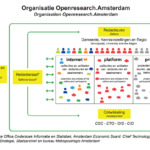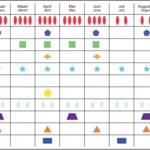One of the challenges in developing the openreserach platform is creating a good governance structure between knowledge institutes and the municipality. How do you organise the governance of a platform where content is created by editors from different organisations, each with their own culture and hierarchy?
The jurisprudence around platforms is relatively new. Does Facebook merely function as facilitator or does the company also play a role in moderating what happens on the site, checking for hateful or other unlawful content? Also openresearch is confronted with these questions around responsibility and liability. One of the first discussions between the legal advisors involved focused on the role of the municipality. The municipality takes the lead in developing the platform and is therefore product owner. Is openresearch a platform owned by the municipality or does the municipality merely facilitate, and what does this mean for liability?
An additional complicating factor in this process is the ambition to share knowledge. Though all of the involved parties are public organisations, sharing knowledge and making information public is not self-evident. For a large part this has to do with culture and fear of risks by possibly publishing confidential or sensitive information. The debate around open access is very much alive in the academic circles right now, but the conversation is still on going. The power of publishers and their intellectual property rights makes sharing knowledge complicated in some cases. The municipality’s policy is “open, unless…” but also here policy is often differs from practice.
Over the courses of almost a year, different legal advisors, privacy officers and data protection officers from the municipality of Amsterdam and knowledge institutes came together to create the right governance for the openresearch platform. At the beginning of this process, every party came to the table with the attitude to pass as many risks as possible to the other parties. The conversation gradually became more constructive. A shared common vision - sharing knowledge as an important tool for the city - changed the conversatioin from thinking in problems to finding solutions and jointly inventing the right governance for this platform.
The chosen form for the governance of this platform now consists of four elements: legal infrastructure, software, behaviour, and the bicycle. In the governance of openresearch, these various elements are laid down in a cooperation agreement, signed in April 2020 by the Executive Boards of the knowledge institutes and the Board of Mayor and Aldermen of Amsterdam.
Legal infrastructure
The employment contract and the code of conduct and / or ethical code that all participants have with their knowledge institute or with the municipality are leading for participation in the platform. After all, the participants have already committed themselves to certain standards and values, the guidelines for desired behaviour, responsibilities, and obligations towards their employer.
This starting point and other important agreements have been drawn up in the cooperation agreement. The main points of this document are:
- role and responsibility of the municipality
- role and responsibility of the participating parties
- agreements related to license, liability, and copyrights
- agreements related to GDPR
As a facilitator of the platform, the municipality of Amsterdam owns and manages the infrastructure of the platform. The municipality is responsible for the general editing of the platform and is responsible for hosting and technical and functional management (maintenance). The municipality ensures that the platform is sufficiently secured in view of the purpose of the platform.
Each participating party is responsible and therefore liable for the research that its editors, participants, and stakeholders have posted on the platform. Parties are not responsible and liable for investigations other than those of their own users.
Research placed in the public layer are made available under the Creative Commons license (attribution - non commercial - share alike). If a participating party does not have the rights to investigations, only a link will be posted to where the publication is lawfully located.
Each party is responsible for complying with the obligations of the GDPR. The parties only process personal data for the social function of the platform via the platform and do not process personal data collected as source data and/or used in research. The basic principle is that users will not place secret and/or confidential information on the platform.
In addition, general terms and conditions have been laid down for users of the platform. Before users can participate, the main points of attention regarding privacy and user rights are brought to the attention by agreeing to these terms and conditions.
Software
Given that the employment contract is leading, only people working at one of the participating organisations can become a participant on the platform. External parties which participate in a specific research project can only do this as a "stakeholder" and can only get an account through an editor. Openresearch software plays an important role in this. The system has a list of "approved" email addresses, where the extensions of participating parties are recognised.
Behaviour
In the general terms and conditions, users are informed of the most important rules of conduct and the most important principles regarding privacy and IP rights. In this way, desired behaviour is stimulated. To assist in communicating both the desired behaviour and the formal rules, the editors of the municipality, regional government organisations, and knowledge institutions are offered special training for editors.
Bicycle
Openresearch.amsterdam is a local platform, made for, with, and by Amsterdam. This was emphasised frequently during the process with the involved legal advisors from different parties. The fact that users can easily visit each other in case of problems is an important feature. In short, if something goes wrong, we pay each other a visit by bike. The importance of locality was also highlighted in the cooperation agreement, under the final provisions: “In the event of any disputes, (in a manner of speaking) the parties first take their bike to talk to each other”.

